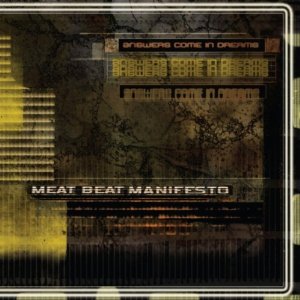Built of IDM’s seminal textural parts, Meat Beat Manifesto brings its answers in dreams and downtempo breakbeats, heavy bass and silence. Throughout Answers there is Jack Danger’s usual aesthetic subdued and thought at least by his label to be a minimalist departure. No, this isn’t exactly Prime Audio Soup territory. Not hooky in the least. Instead Dangers sounds as if he’s spent more time on the astral plane with Ghosts-era Trent Reznor (the two do have a past, remember), trading the vocal bits, delayed/distorted snares, and cataclysmic sub-claps that litter this album like blown concrete at a dark, smoldering hypocenter.
More now than ever, perhaps lent from a better focus to this hard minimal bent, Dangers accosts ears and speakers, relying on a Plutonian bottom-end to pass the trunk-rattle far below the coiled, acidic mid-range synthesis that passes for Meat Beat melody these days. It’s difficult at times to gain one’s bearings when listening. This observation isn’t limited to the tonal palette alone. Answers Come In Dreams really screeches and tears. It’s industrial. It’s a stalemate between dubstep’s characteristic wobble and the various discordant bleeps and factory clangs that hit all the black keys in often arpeggiating shuttle sequences that stomp at the base some odd analog circuitry wired for actual rocketry. Appropriately, Dangers grades each track through calculated percussive additions or small shifts in rhythm, degraded tone and terseness. At points where it sounds as if nothing has changed, that no new noise ballast be laid, he reveals his influence: erudite knowledge of subterranean vinyl; in ‘Token Words’, a Terre Thaemlitz-esque jaunt through a sewer; tube compression and the decibel threshold for pain. Dangers has been at this for a while now.
But Answers doesn’t tell us anything, not at its start or eventually. Where in tracks like ‘Quietus’ and ‘Mnemonic’, sub-bass is the expressive instrument, one hopes for more expression. More downright evil wobble like that on Jack Sparrow’s recent Circadian. Where a purist might hope to collect notes for the remnant samples used throughout, there are fewer here than usual. Certainly some less distinguished. Where one wants a break from the weight of it all, there are few. In the albums’ more forgiving moments, such as the opening of ‘Luminol’ where we’re made audience to toxic Burial-step, or at the midpoint, on ‘#zero’, where numbers station samples couple with an eerily inverted trance-arpeggio make for such good expansion.
It’s quite nice to have the aforementioned ‘Token Words’, the obvious ambient modulation between beat-assaults, to remember that there are tracks on this album distinct beyond its simply cavalier, noughties attitude. Really for us, and not for Dangers, it’s unfortunate that the trappings of more typical IDM are felt too often, frequently and so grimly. Answers does exhibit itself well, outside the context of the genre. In art, one should always consider the artist’s first intent. That’s clear here. Dangers has, by and large, built a good bludgeon out of his skill for sound design. He’s accurate, assimilating enough corroded iron to this gate that one’s not sure quite how to escape. One can put no fault on the man himself. What’s produced here, what answers came to him in dreams, were not at heart bad answers. They were good ones, corrosive and routine, from dreams we’ve seen elsewhere in this mind.


